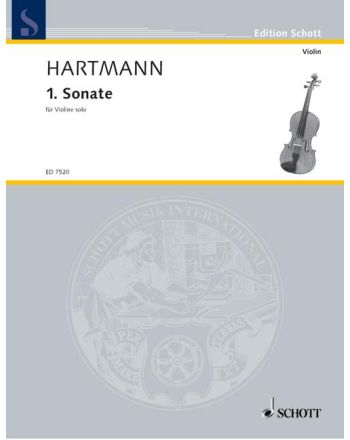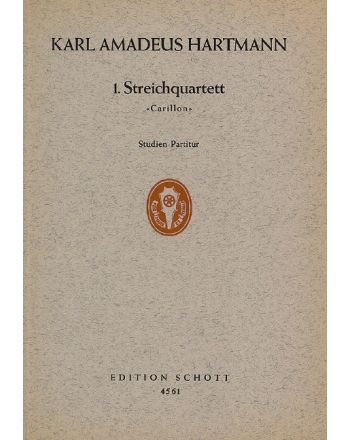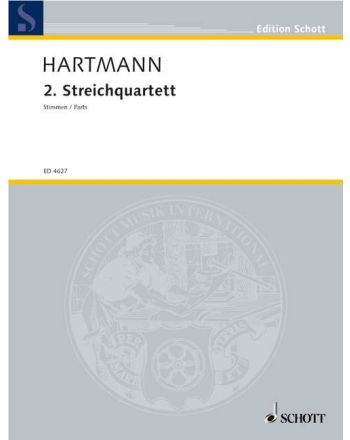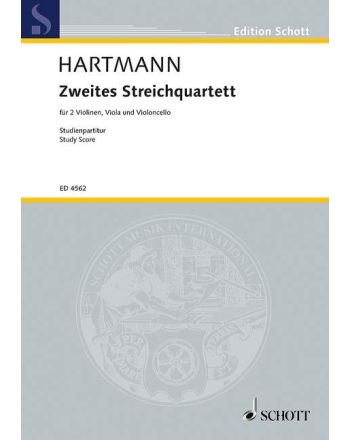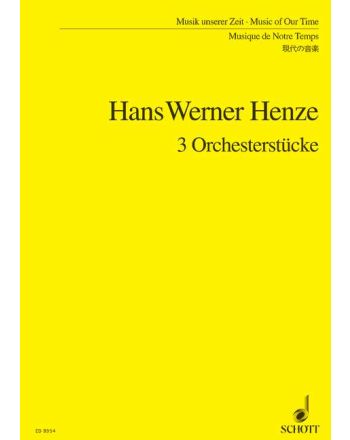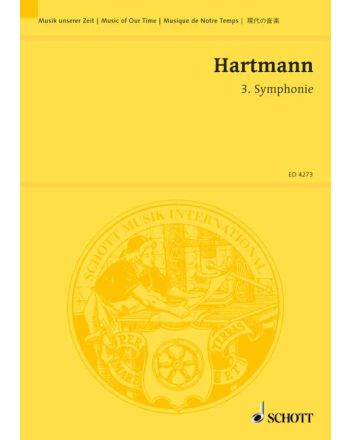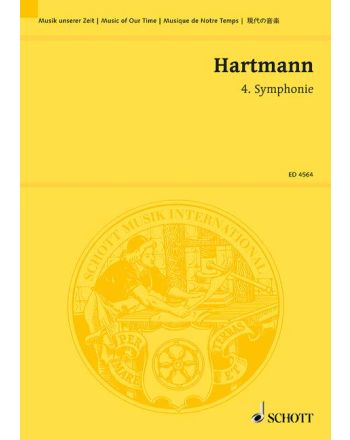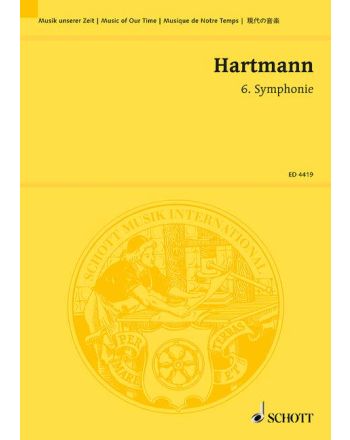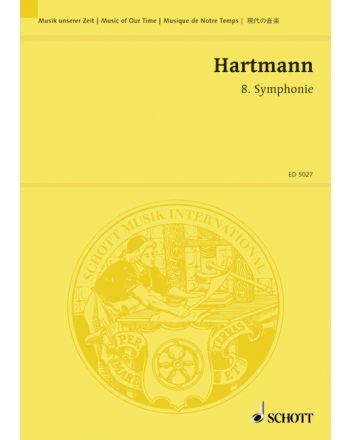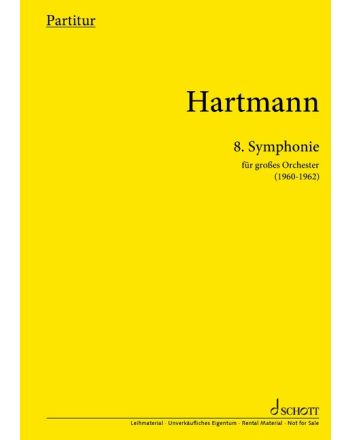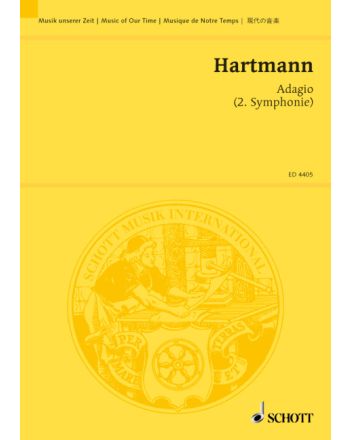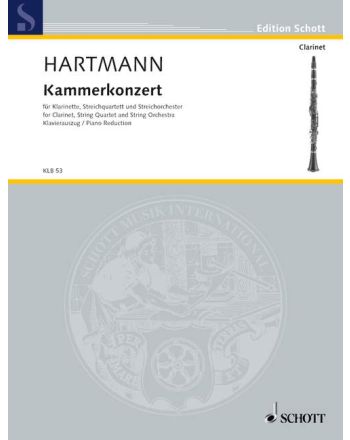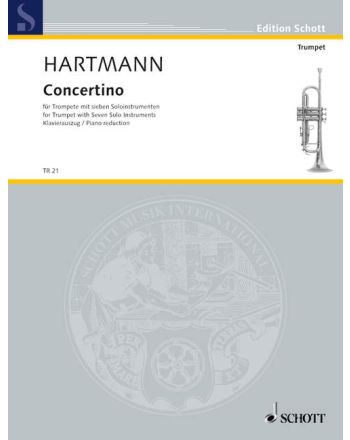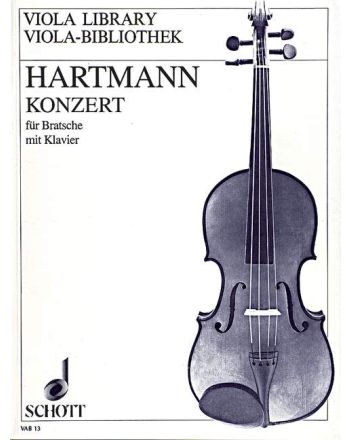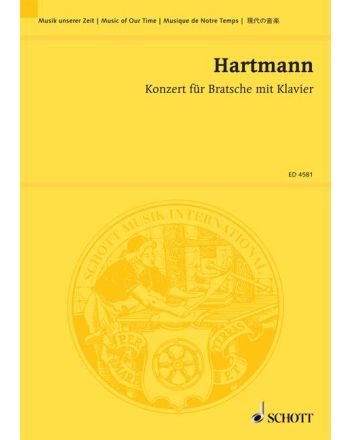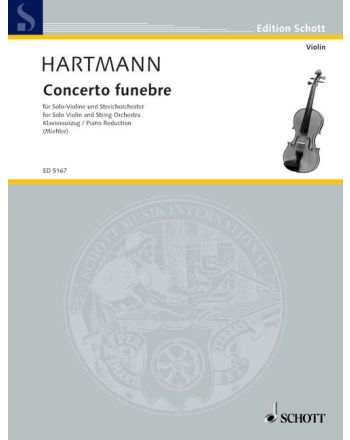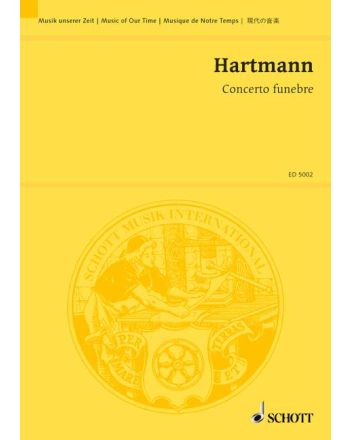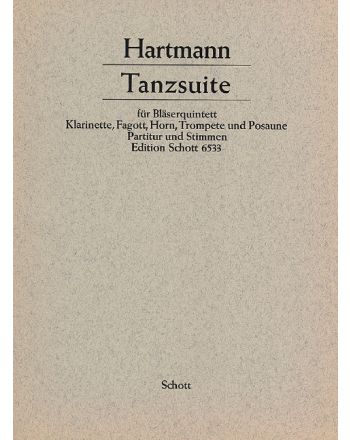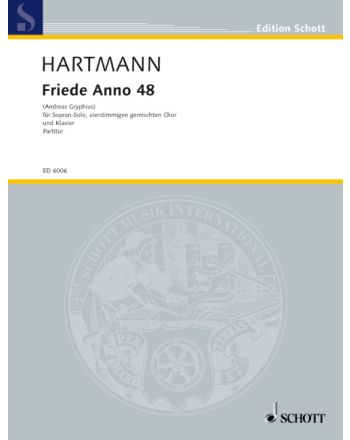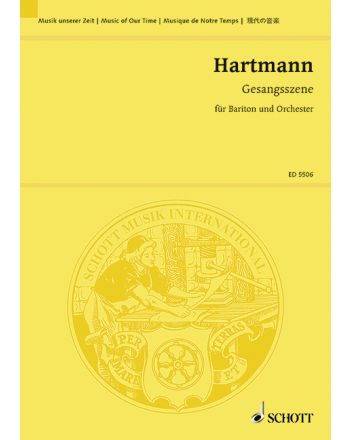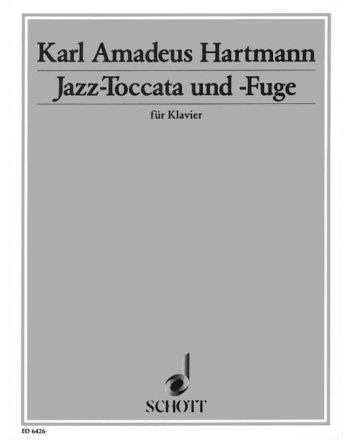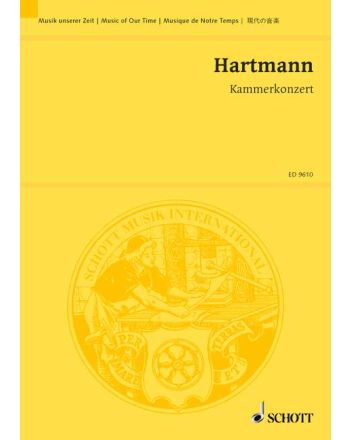
Karl Amadeus Hartmann
Upcoming Performances
About Karl Amadeus Hartmann
His concept of life oriented towards humanity is inscribed in all his scores. A warning in view of the atrocities of this world, but also resistance from the heart: a revocation of the spirits, love and life. (Udo Zimmermann)
Karl Amadeus Hartmann was born on 2 August 1905 in Munich and came into contact with art and music at an early stage. He studied trombone and composition at the Staatliche Akademie der Tonkunst in Munich from 1924 to 1929. Hartmann presented his first composition which displayed influences of jazz, Dadaism, persiflage technique and New Objectivity within the framework of the Opera Studio at the Bavarian State Opera. His Miserae for orchestra brought him initial international recognition at its performance at the IGNM Festival in Prague in 1935; in 1936, he won the Carillon competition in Geneva with his String Quartet No. 1. Following studies with Hermann Scherchen, Hartmann became the pupil of Anton Webern in 1941/42 whose compositional style exerted a strong influence in the following years.
In 1945, the composer was appointed as dramatic producer at the Bavarian State Theatre. Hartmann’s attempt to acquaint the audiences not only with classical modern works but also contemporary music by young composers became the guiding concept of the musica viva concerts which Hartmann organised right up until his death. The apocalyptic vision of the Gesangsszene for baritone and orchestra on texts from “Sodom and Gomorrha” remained unfinished and was published posthumously. Hartmann died on 5 December 1963.
After the seizure of power by the National Socialists in 1933 which resulted in a ban on the performance of Hartmann’s works, he regarded composition as his commitment to humanity. Several of his works are based on direct autobiographical experiences. The Sonate "27. April 1945" for piano originated as a reaction to an encounter with a train filled with prisoners who were expelled from the camp Dachau by the SS shortly before the end of the war. The sombre underlying atmosphere blends with the expression of solidarity and hope of salvation from tyranny. Melodic fragments with Jewish influences permeate the opera Simplicius Simplicissimus which was composed in 1934/35 (and revised in 1956/57) following encouragement by Scherchen and incorporates songs and chorales. The libretto based on Grimmelshausen’s Baroque novel affirms the dignity of the individual confronted by a world of barbarity and establishes parallels between the Thirty Years’ War and Fascism.
Alongside the violin concerto (Concerto funebre) composed in 1939, Hartmann’s eight symphonies provide an impressive and committed testimony to the composer’s instrumental oeuvre. During the post-war years, Hartmann began to revise the substantial symphonic sketches which he had created during his period of internal emigration. The preliminary phases of the 1st Symphony with the subtitle “Versuch eines Requiems” [Attempt at a Requiem] date back to the year 1935 and the 3rd Symphony (1948/49) is based on a “Sinfonia tragica” from 1940. The Symphonie Concertante (5th Symphony), completed in 1951, also utilises material from a previously conceived composition, the burlesque Concertino for trumpet and wind ensemble (1933). Within the framework of a compositional commission by the Bavarian broadcasting company Bayerischer Rundfunk, Hartmann revised his “Symphonie L’Oeuvre” based on Zola which was given its first performance in 1953 as the 6th Symphony. In 1963, the 8th Symphony was premiered in Cologne. The work appears as the concentrated sum of the entire symphonic and concerto oeuvre of Hartmann with its juxtaposition of scherzo, fugal and finale elements.
From 1948 onwards, Hartmann’s compositions were performed with increasing frequency. In 1949, he was awarded the Music Prize of the City of Munich. This was followed by the Kunstpreis from the Bavarian Academy of the Fine Arts (1950), the Arnold Schoenberg Medal from the IGNM (1954), the Große Kunstpreis from the federal state of North-Rhine Westphalia (1957) and the Ludwig Spohr Prize from the city of Braunschweig (1959), the Schwabinger Kunstpreis (1961) and the Bavarian Order of Merit (1959). Hartmann became a member of the Academy of Arts in Munich (1952) and in Berlin (1955) and received an honorary doctorate from the Spokane University in Washington in 1962.
Worklist
Chronology
Products
-
"An schöne Stunden denk ich immer"Composer: Karl Amadeus HartmannSeries: Edition Schott
1. Sonate
Instrumentation: violinProduct number: ED 7520Product TypeIn stockAs low as €16.99Incl. Tax -
"Carillon"Composer: Karl Amadeus HartmannMedia Type: Sheet musicEdition: Study scoreSeries: 1. Streichquartett
Instrumentation: String quartetProduct number: ED 4561Print editionPrint editionIn stock€19.00Incl. Tax, Excl. Shipping -
"Carillon"Composer: Karl Amadeus HartmannEdition: Set of partsSeries: 1. Streichquartett
Instrumentation: string quartetProduct number: ED 4626Product TypeIn stockAs low as €24.99Incl. Tax -
Versuch eines RequiemsComposer: Karl Amadeus HartmannEdition: Study scoreSeries: Music Of Our Time
1. Symphonie
Instrumentation: altovoice and orchestraProduct number: ED 4577Product TypeIn stockAs low as €27.99Incl. Tax -
Versuch eines RequiemsComposer: Karl Amadeus HartmannMedia Type: Hire/performance materialEdition: Performance materialLanguage: GermanHire/performance materialHire/performance material
-
Composer: Karl Amadeus HartmannEdition: Set of partsSeries: Edition Schott
2. Streichquartett
Instrumentation: string quartetProduct number: ED 4627Product TypeIn stockAs low as €32.99Incl. Tax -
Composer: Karl Amadeus HartmannEdition: Study scoreSeries: 2. Streichquartett
Instrumentation: string quartetProduct number: ED 4562Product TypeIn stockAs low as €33.99Incl. Tax -
Composer: Karl Amadeus HartmannMedia Type: Sheet musicSeries: 1. Sonate
Instrumentation: violinProduct number: ED 7521Print editionPrint editionIn stock€22.00Incl. Tax, Excl. Shipping -
für Streichorchester eingerichtet von Henning BrauelHire/performance materialHire/performance material
-
based on a piano music by Karl Amadeus HartmannComposer: Karl Amadeus Hartmann | Hans Werner HenzeEdition: Study scoreSeries: Music Of Our Time
3 Orchesterstücke
Instrumentation: orchestraProduct number: ED 8954Product TypeIn stockAs low as €25.99Incl. Tax -
Composer: Karl Amadeus HartmannEdition: Study scoreSeries: Music Of Our Time
3. Symphonie
Instrumentation: Large OrchestraProduct number: ED 4273Product TypeIn stockAs low as €24.99Incl. Tax -
für großes OrchesterHire/performance materialHire/performance material
-
für StreichorchesterHire/performance materialHire/performance material
-
Composer: Karl Amadeus HartmannEdition: Study scoreSeries: Music Of Our Time
4. Symphonie
Instrumentation: string orchestraProduct number: ED 4564Product TypeIn stockAs low as €18.99Incl. Tax -
Composer: Karl Amadeus HartmannEdition: Study scoreSeries: Music Of Our Time
6. Symphonie
Instrumentation: large orchestraProduct number: ED 4419Product TypeIn stockAs low as €32.99Incl. Tax -
für großes OrchesterHire/performance materialHire/performance material
-
Composer: Karl Amadeus HartmannEdition: Study scoreSeries: Music Of Our Time
7. Symphonie
Instrumentation: large orchestraProduct number: ED 5005Product TypeIn stockAs low as €34.99Incl. Tax -
für großes OrchesterHire/performance materialHire/performance material
-
Composer: Karl Amadeus HartmannEdition: Study scoreSeries: Music Of Our Time
8. Symphonie
Instrumentation: large orchestraProduct number: ED 5027Product TypeIn stockAs low as €26.99Incl. Tax -
für großes OrchesterHire/performance materialHire/performance material
-
(2. Symphonie)Hire/performance materialHire/performance material
-
Composer: Karl Amadeus HartmannEdition: Study scoreSeries: Music Of Our Time
Adagio
Instrumentation: Large OrchestraProduct number: ED 4405Product TypeIn stockAs low as €22.99Incl. Tax -
für Bläser, Schlagzeug und KlavierHire/performance materialHire/performance material
-
Composer: Karl Amadeus HartmannMedia Type: Sheet musicEdition: Choral scoreSeries: Schott Choral Music
Instrumentation: men's choir (TTTBBB) a cappellaLanguage: GermanProduct number: C 51967Print editionPrint editionIn stock€7.50Incl. Tax, Excl. Shipping -
Composer: Karl Amadeus HartmannEdition: Piano reduction with solo partInstrumentation: clarinet, string quartet and string orchestraProduct number: KLB 53Product TypeIn stockAs low as €29.99Incl. Tax
-
Nr. 3 aus dem "Wachsfigurenkabinett"Composer: Karl Amadeus HartmannArranger: Wilfried HillerMedia Type: Hire/performance materialEdition: Performance materialLanguage: GermanHire/performance materialHire/performance material
-
Composer: Karl Amadeus HartmannEdition: Piano reduction with solo partSeries: La Tromba
Edition Schott
Concertino
Instrumentation: Trumpet with 7 Solo-Instruments (Clarinet in B flat, BassClarinet in B flat, Bassoon, Contrabassoon, French Horn in F, Trumpet in C, Tuba)Product number: TR 21Product TypeIn stockAs low as €22.99Incl. Tax -
für Trompete mit sieben SoloinstrumentenHire/performance materialHire/performance material
-
begleitet von Bläsern und SchlagzeugComposer: Karl Amadeus HartmannEditor: Wilhelm KillmayerEdition: Piano reduction with solo partInstrumentation: viola, piano, wind instruments and percussionProduct number: VAB 13Product TypeIn stockAs low as €27.99Incl. Tax
-
begleitet von Bläsern und SchlagzeugComposer: Karl Amadeus HartmannEdition: Study scoreInstrumentation: viola, piano, wind instruments and percussionProduct number: ED 4581Product TypeIn stockAs low as €34.99Incl. Tax
-
Composer: Karl Amadeus HartmannMedia Type: Sheet musicEdition: Study scoreSeries: Music Of Our Time
Konzert
Instrumentation: Piano, Wind Instruments and PercussionProduct number: ED 4421Print editionPrint editionIn stock€29.00Incl. Tax, Excl. Shipping -
Composer: Karl Amadeus HartmannEdition: Piano reduction with solo partSeries: Edition Schott
Concerto funebre
Instrumentation: violin and string orchestraProduct number: ED 5167Product TypeIn stockAs low as €19.99Incl. Tax -
Composer: Karl Amadeus HartmannEdition: Study scoreSeries: Music Of Our Time
Concerto funebre
Instrumentation: solo-violin and string orchestraProduct number: ED 5002Product TypeIn stockAs low as €13.99Incl. Tax -
für Solo-Violine und StreichorchesterHire/performance materialHire/performance material
-
Composer: Karl Amadeus HartmannInterpreter: Yorck Kronenberg | Elisabeth Kufferath | Benjamin Schmid | Florian UhligConductor: Paul GoodwinOrchestra/ensemble: SWR Rundfunkorchester KaiserslauternMedia Type: CDProduct number: WER 67142CDCDIn stock€18.50Incl. Tax, Excl. Shipping
-
Composer: Karl Amadeus HartmannMedia Type: Sheet musicEdition: Score and partsInstrumentation: clarinet, horn, bassoon, trumpet and tromboneProduct number: ED 6533Print editionPrint editionIn stock€32.00Incl. Tax, Excl. Shipping
-
Nr. 2 aus dem WachsfigurenkabinettComposer: Karl Amadeus HartmannArranger: Guenter Bialas | Hans Werner HenzeMedia Type: Hire/performance materialEdition: Performance materialLanguage: GermanHire/performance materialHire/performance material
-
Bilder einer Entwicklung aus dem deutschen Schicksal nach Hans Jacob Christoffel von Grimmelshausen (Urfassung)Composer: Karl Amadeus HartmannEditor: Wilfried Hiller | Robert KlimeschMedia Type: Hire/performance materialEdition: Performance materialLanguage: GermanHire/performance materialHire/performance material
-
Nr. 5 aus dem WachsfigurenkabinettComposer: Karl Amadeus HartmannMedia Type: Hire/performance materialEdition: Performance materialLanguage: GermanHire/performance materialHire/performance material
-
Print editionPrint editionIn stock€23.00Incl. Tax, Excl. Shipping
-
nach Texten von Andreas GryphiusComposer: Karl Amadeus HartmannEdition: Score, (= piano part)Series: Edition Schott
Friede Anno 48
Product number: ED 6006Product TypeIn stockAs low as €42.99Incl. Tax -
nach Texten von Andreas GryphiusComposer: Karl Amadeus HartmannMedia Type: E-score PDFEdition: Choral scoreSeries: Friede Anno 48
Language: GermanProduct number: ED 6006-01 Q9048E-score PDFE-score PDFIn stock€7.99Incl. Tax -
Nr. 4 aus dem WachsfigurenkabinettComposer: Karl Amadeus HartmannArranger: Hans Werner HenzeMedia Type: Hire/performance materialEdition: Performance materialLanguage: GermanHire/performance materialHire/performance material
-
zu Worten aus "Sodom und Gomorrha"Composer: Karl Amadeus HartmannEdition: Study scoreSeries: Music Of Our Time
Gesangsszene
Instrumentation: baritone and orchestraProduct number: ED 5506Product TypeIn stockAs low as €24.99Incl. Tax -
für Bariton und OrchesterComposer: Karl Amadeus HartmannMedia Type: Hire/performance materialEdition: Performance materialLanguage: GermanHire/performance materialHire/performance material
-
zu Worten aus "Sodom und Gomorrha"Composer: Karl Amadeus HartmannMedia Type: Sheet musicEdition: Piano reductionSeries: Gesangsszene
Instrumentation: baritone and orchestraLanguage: GermanProduct number: ED 5464Print editionPrint editionIn stock€32.00Incl. Tax, Excl. Shipping -
Product TypeIn stockAs low as €13.99Incl. Tax
-
Composer: Boris Blacher | Karl Amadeus Hartmann | Hans Werner Henze | Rudolf Wagner-RégenyMedia Type: Sheet musicEdition: Piano reduction, (= choral score)Instrumentation: soloists (ABar), chamber choir, 2 speakers and small orchestraLanguage: GermanProduct number: BB 5500302Print editionPrint editionIn stock€19.50Incl. Tax, Excl. Shipping
-
Composer: Karl Amadeus HartmannEdition: Full and study scoreSeries: Music Of Our Time
Kammerkonzert
Instrumentation: clarinet, string quartet and string orchestraProduct number: ED 9610Product TypeIn stockAs low as €28.99Incl. Tax -
für Klarinette, Streichquartett und StreichorchesterHire/performance materialHire/performance material

